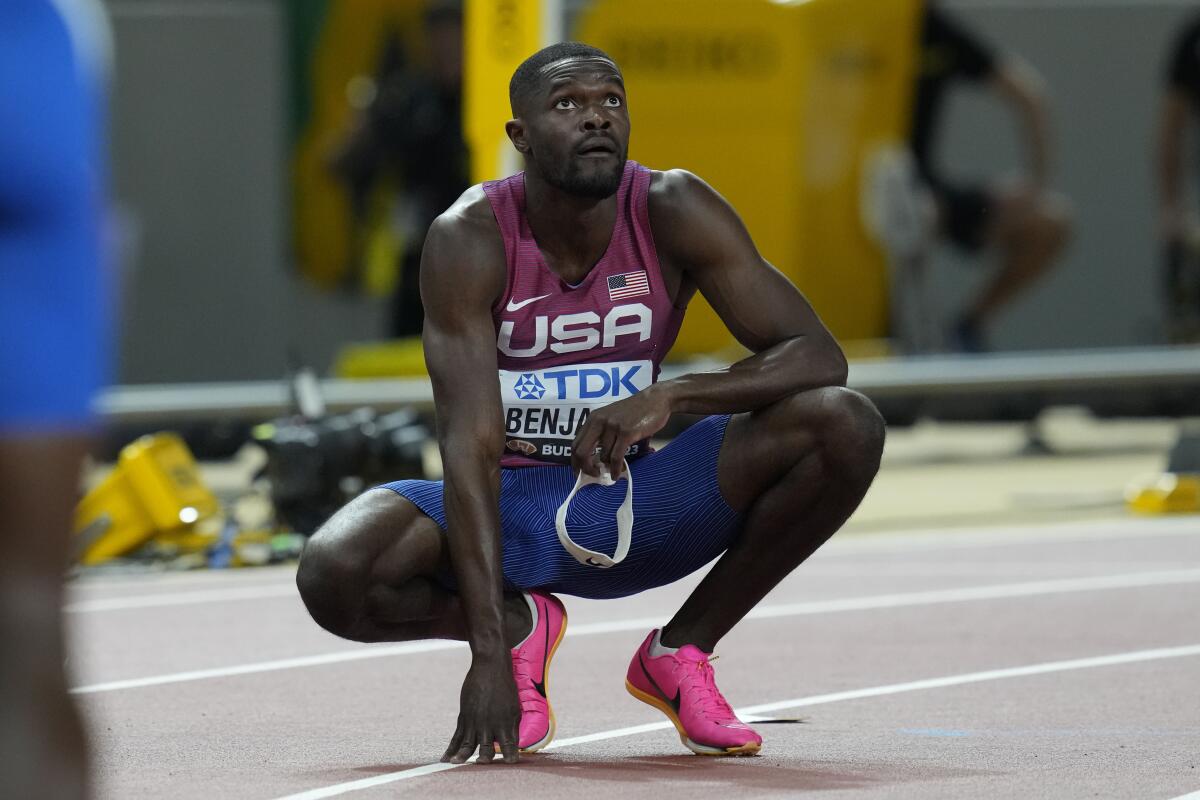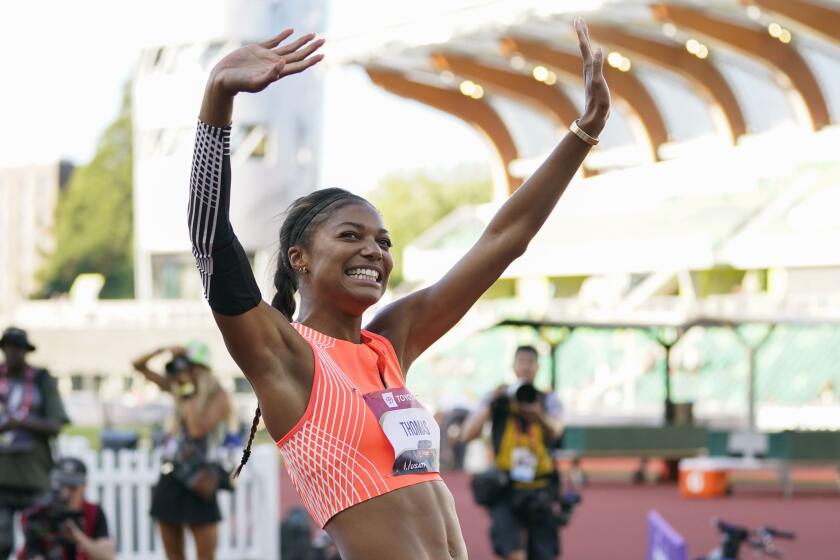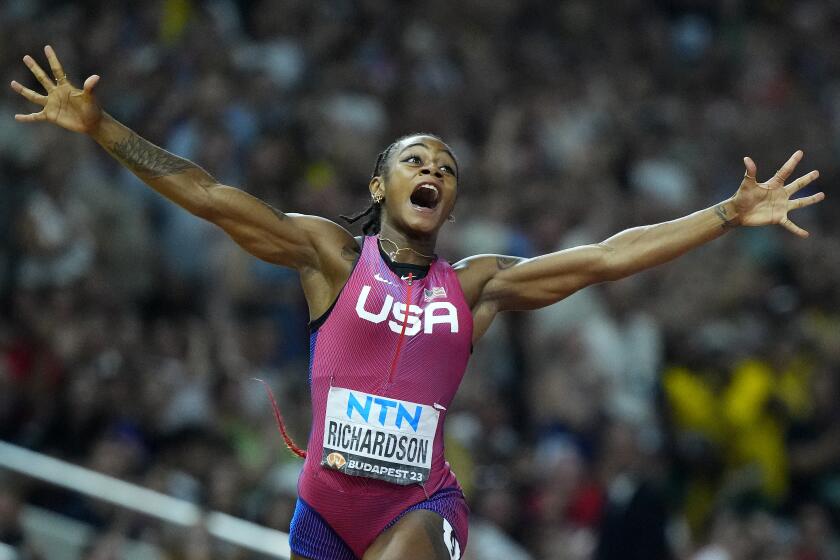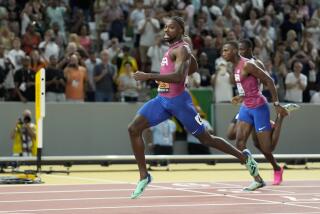Rai Benjamin takes bronze in men’s 400-meter hurdles at world championships

- Share via
Despite building a resume like few hurdlers in track and field’s history, Rai Benjamin entered this season fixated on what was missing.
The 26-year-old American’s young career was defined by being oh-so close: The former All-American at UCLA and USC who trains in Los Angeles owns history’s second-fastest time in the 400-meter hurdles, and silver medals from world championships in 2019 and 2022 and the Tokyo Olympics in 2021.
On Wednesday evening at track’s world championships in Budapest, Hungary, the gold he had long sought was only a meter ahead when Benjamin cleared the eighth of 10 hurdles in the 400-meter final, with about 110 meters remaining. Only Norway’s Karsten Warholm, the world record-holder in the next lane, lay ahead. But over the final stretch Benjamin couldn’t close the gap or overtake Warholm, who surged to another world championship in 46.89 seconds.
Kyron McMaster scored a surprising silver for the British Virgin Islands in 47.34, and Benjamin finished third in 47.56.
What was learned at USATF championships? Gabby Thomas and Rai Benjamin make big impact along with Sha’Carrie Richardson and Sydney McLaughlin-Levrone.
Featuring Warholm, Benjamin and reigning world champion Alison dos Santos of Brazil, the trio that has pushed the event’s limits to previously unheard-of times, Wednesday’s final was highly anticipated, even though it came with caveats: Dos Santos still was recovering from February knee surgery, and Benjamin had lost eight weeks of racing in May and June while recovering from a quadriceps injury.
Halfway through, Benjamin was first, running 21.83 for 200 meters to Warholm’s 21.86. At 300 meters, Warholm had edged ahead by nine-hundredths of a second. He widened the gap in the final straightaway by running the final 100 in 13.28 seconds, 58-hundredths faster than Benjamin.
Benjamin’s career has not been without its golden moments. An all-American for UCLA in 2016 and 2017, he transferred to USC and promptly broke the collegiate 400 hurdles record before turning professional, where success followed, winning gold medals in the 4x400-meter relay at the 2019 world championships and 2021 Tokyo Olympics.
Yet individual victory at a global championship has eluded him. Benjamin’s rise to prominence coincided with that of Warholm and dos Santos. Of history’s 10 fastest times in the 400 hurdles, nine were run by either Warholm, the world-record holder, Benjamin (No. 2 all time) or dos Santos (No. 3) in the last two years.
The gap between silver and gold in previous championships had come down to inexperience, Benjamin said in July. He said this after winning the U.S. championship, but he was confident that he was “the fastest person in the field.”
“I’ve gotten silver these past three championships, it’s no secret, it’s the talk of the town, but at the same time I’m the most consistent person in the field if you look at it,” Benjamin said July 9 in Eugene, Ore. “Last year I mean [Warholm and Benjamin] were both hurt, I medaled. It’s just one of those things where, it’s just like, at a certain point you’ve got to give me my respect at the end of the day. I don’t really find fulfillment off of what other people say, but when the peanut gallery is talking about you and they haven’t really been there it’s just like dude, sit down. You haven’t been here, you guys don’t run the times that we’re running at all.
Sha’Carri Richardson won the 100-meter title at the world championships, but it didn’t set in until she saw her time — a meet-record 10.65 seconds.
“It’s hard to maintain this level of competitiveness and running fast and it’s taken its toll on everyone.”
That toll was prominent for Benjamin this season. His training partner dating back to USC, Michael Norman, changed coaches and training groups in the spring, which Benjamin said left him searching for motivation for weeks. He made clear he did not blame Norman for making his switch, but “I got to a point where I was just like, man, I don’t even know if I want to run the rest of the season — it was that bad,” he said.
Then, after a race May 5, Benjamin suffered a left quadriceps injury and didn’t race for eight weeks. His recovery required a visit to a doctor in Germany, and some weeks when he couldn’t train for three or four days at a time.
“It was really tough,” Benjamin said. “Really, really tough.”
Wednesday’s result also qualifies as such. Benjamin will aim for a spot at next year’s Paris Olympics still searching for his elusive gold medal.
More to Read
Go beyond the scoreboard
Get the latest on L.A.'s teams in the daily Sports Report newsletter.
You may occasionally receive promotional content from the Los Angeles Times.








